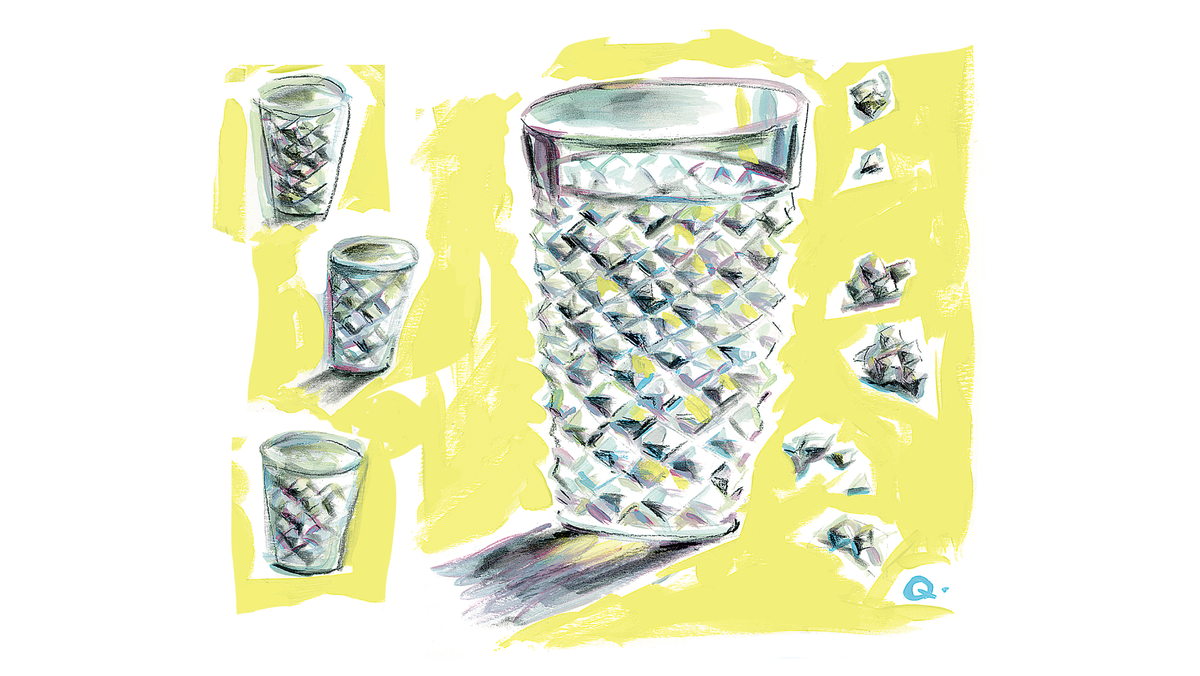Summer Stories: ‘An Incident, With Glass’
Thom Caraway is the author of the new short story, “An Incident. With Glass,” for the conclusion of Summer Stories 2022. (Rajah Bose)
By Thom Caraway
And just like that POOF! a couple houses were empty and another was full. Too full, but they couldn’t stop ordering things.
“How about this one?” Finger to screen, scroll, scroll. “This one?” Scroll, scroll.
“Wait, those might work. I like those.”
Why those might work and the others would not was unclear. They were just water glasses. Between them all, there were currently 31 glasses, cups, jars, beakers, vases, decanters, bottles, and cans that might suffice as conveyers of water from tap to mouth. But here they were, still scrolling.
“You know, I could care less. I don’t know why we’re spending money on this,” one said, waving meaningfully in the direction of the 31 other containers, arrayed neatly on the dining room floor.
“Two things. One: they aren’t just right. Two: we can sell all those in the yard sale and make back twice what these ones cost. And THESE” pointing pointedly at the screen, “are just right.”
A shrug, a nod. Glasses ordered.
“Should be here in three days.”
“What do we do with these until then?”
“Box them up.” Shrug.
“What do we drink out of?”
“Straight from the tap, I dunno, but I can’t stand another minute with these awful things fuzzing up the space.” It was a promising new adventure. Things had to be just so.
Pursed lips. Shrug. Sigh.
“Now.” Heads turned back to the screen. “Let’s think about lighting.” Seven lamps set in various places around the room. Rolled eyes, shrug.
When the glasses arrived, a day after the new floor lamps, the front porch was piled with full boxes, recently delivered. The back porch was piled with empty boxes, recently emptied. The garage was piled with things to sell in the yard sale, most everything any of them had ever possessed.
One of them picked up the glasses box. It rattled and tinkled.
“Ughhhh, but these were JUST RIGHT.”
“It’s OK, this is perfect, actually. Now they ARE just right.”
Begrudging sigh, a nod.
Six glasses still intact. One with a hairline crack, set on the mantle, in case someone took up that Japanese art of filling in cracked things with gold. The most broken one went away.
“We’ll just invite fewer people over…”
“Let’s order a replacement box. They’ll send more since they broke some.”
“…Or have them bring their own glasses?”
“There’s still some in the garage…”
In unison, “Those are for the yard sale!”
Sigh.
Next day, more glasses. Tinkle, rattle.
“Who ordered more?”
Shrugs.
Several made it out of the box intact.
“A full set, at least.” Two more on the mantle, in case.
Empty boxes covered the porch, the patio, the entire way to the garage. Things went into the garage rafters. Old things, for the yard sale.
And more packages arrived. Flatware, a chaise. Phone chargers, stuffed animals, new pillows, fuzzy blankets.
“Should we stop? This is getting…”
Concerned raised brows. Shrug.
“What else can we do?”
And every day, boxes of glasses. Each box with broken and whole and fractured ones. Each one taken out and set with the rest. Every cabinet full, every surface covered. The mantle full, just in case, then the bricks in front of the fireplace, then the fireplace. The glasses were just right. They were perfect.
After two weeks they stopped calling to stop the boxes. It was no use, they were told. There was nothing to be done. The policy was the way it was and nobody could change it. The boxes kept coming. Two a day, three, four. They stopped opening the boxes to check on the glass. Neighbors slowed down as they drove past.
Resigned sigh. Shrug. A nod.
After six months of daily deliveries, the house was unusable, impassable, but they were locked in. There was nothing to be done. They’d stopped unboxing the glasses months ago, used the packed boxes to build a fort in the back yard, then the fort kept growing. In one corner they built a spiral stair, so they could keep building walls up as more boxes arrived, two or three an hour. The boxes-of-glasses house grew. The neighbors stopped and got out of their cars.
The policy finally ran its course; the house of boxes of glasses was 10 stories high. Dozens of people lived there. Neighbors whose views had been obstructed, mostly, but others, too. There never was a yard sale.
When the house of boxes of glasses started to collapse it sounded like the end of a long summer; it sounded like an ice shelf sliding into the ocean; like horses galloping across hardwood floors; like a thousand windchimes clanging at once. There’d been signs, they agreed later: the teetery wobbles, suspicious swaying, odd shivers in the walls. The tenants had evacuated in plenty of time. It sounded like the first thaw of spring passing over a fall, like camera shutters clicking, like small birds, everywhere. When the house of boxes of glasses collapsed, it sounded like the end of the world. But it wasn’t.
Just as they’d appeared, they mostly disappeared, so that by the time it was over, only a couple dozen boxes were left.
“These don’t have any glasses at all. A lot of these are just empty.”
Eye brow raise. Shrugs. They sifted through what was left.
“We’d stopped checking, just assumed they were the same glasses we’d been getting.”
Some boxes were full of socks. Others were rolls of tape. Some had feathers. One was a box of box elder bugs.
“Not the best building material.”
Sigh, a nod.
Once everything was cleaned up, they sat in the living room. The water was clear and icy in their glasses. The one original cracked one remained on the mantle.
“We should fix that one. Complete the set. It’ll be great.”
Nods. Smiles.

